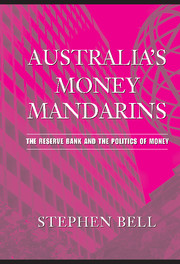Book contents
- Frontmatter
- Contents
- List of Illustrations
- Preface
- Abbreviations
- Introduction
- 1 Slowly Building the Reserve Bank
- 2 Into the Monetary Policy Wilderness
- 3 Snapping the Stick of Inflation
- 4 ‘A Measure of Peace’? Monetary Policy in the 1990s
- 5 Towards RBA Independence
- 6 RBA Independence – Why?
- 7 Should the RBA Be Independent?
- 8 Internal Governance and the Board
- 9 New Challenges in a World of Asset Inflation
- Conclusion
- Notes
- References
- Index
Introduction
Published online by Cambridge University Press: 06 October 2009
- Frontmatter
- Contents
- List of Illustrations
- Preface
- Abbreviations
- Introduction
- 1 Slowly Building the Reserve Bank
- 2 Into the Monetary Policy Wilderness
- 3 Snapping the Stick of Inflation
- 4 ‘A Measure of Peace’? Monetary Policy in the 1990s
- 5 Towards RBA Independence
- 6 RBA Independence – Why?
- 7 Should the RBA Be Independent?
- 8 Internal Governance and the Board
- 9 New Challenges in a World of Asset Inflation
- Conclusion
- Notes
- References
- Index
Summary
Central banks must be among the least well understood institutions in the entire world.
Alan Blinder, former Deputy Chair, US Federal ReserveCentral banking is a strange profession little understood by the members of the public.
H. C. ‘Nugget’ ‘Coombs, former RBA GovernorCentral banks stand at a fascinating interface between the economy and politics. These days their primary role is to conduct monetary policy, typically by regulating the supply or price of money in the economy. Central banks also have responsibility for the stability of the financial system, act as a lender of last resort in financial calamities, act as a banker to other banks and to governments, and perform a range of other functions in banking and financial systems. In recent decades, in a world of burgeoning financial markets, major assaults on inflation, and a proliferation of financial calamities, central banks have risen to unprecedented prominence. They also face unprecedented challenges.
Central banks became critical institutions in modern capitalism in the latter part of the twentieth century. Standing at the centre of an inflation-prone, traumatised monetary system and at the interface between nation states and newly deregulated and increasingly powerful financial markets, central banks broke out of their cloistered existence and became powerful, aggressive inflation-fighting machines. So pivotal did they become in the fight against inflation that governments worldwide handed them substantial control over monetary policy – these days, the most important weapon of short-term macroeconomic policy. The fight against inflation was a hard-won victory.
- Type
- Chapter
- Information
- Australia's Money MandarinsThe Reserve Bank and the Politics of Money, pp. 1 - 4Publisher: Cambridge University PressPrint publication year: 2004
- 1
- Cited by



